ISTANBUL // A row over the headscarf ban at Turkey's universities has been one of the most controversial issues in Ankara for years.
Now the ban is collapsing, but it is coming down not with a bang but with a whimper.
The country's higher education board has ruled that female students can wear the veil in class, and even the leader of the main secularist party says he is willing to end the prohibition.
"We have reached a very good position to solve the problem," Abdullah Gul, Turkey's president, said this week in a meeting with Yusuf Ziya Ozcan, the head of Turkey's Board of Higher Education (YOK), according to Mr Ozcan. "That is a view shared by everyone."
As Mr Ozcan spoke, the ban was officially being lifted at several universities. "Our students can now enter class in a headscarf, or they can enter class in shorts," Nihat Inanc, rector of the Alparslan University in the city of Mus, told reporters.
Kemal Kilicdaroglu, the leader of the Republican People's Party (CHP), the main opposition group, which has long supported the ban, has spoken in favour of letting students with headscarves into classrooms. He is trying to broaden the electoral appeal of his party before next year's general elections.
That is a remarkable turnaround for a country that has failed for years to find consensus on the issue. The headscarf ban has been a focal point for Turkey's struggle to reconcile its character as a predominantly Muslim country with its secular state structure.
Although two out of three women in Turkey cover their hair and although the religiously conservative government has been campaigning for years to have the ban lifted, many secularists regard the headscarf as a symbol of political Islam that should be kept out of universities.
In 2008, the CHP, as the main secularist party, asked the constitutional court to overturn a law that lifted the ban. The court ruled in CHP's favour.
In the same year, the ruling party in Ankara narrowly escaped being shut down by the constitutional court for anti-secular activities. At the time, the prosecutor cited efforts to lift the headscarf ban as key evidence in his case against the Justice and Development Party (AKP). The court issued a stern warning to the AKP, but did not dissolve it.
The beginning of the end for the headscarf ban came two weeks ago when the YOK ruled that a student at Istanbul University had been unfairly dismissed from class for hiding her hair under a hat. That is a common tactic for students who want to circumvent the headscarf ban.
The YOK told officials at the university that they had no right to punish students for violations of disciplinary rules by throwing them out of the classroom. Although the ruling did not mention the veil, the implication was that students in headscarves could attend classes.
"We are against people being thrown out of class because of their dress; from now on they will not be thrown out anymore," Mr Ozcan said after the ruling was issued. He said he expected a political agreement to officially lift the headscarf ban shortly.
Mr Kilicdaroglu said he supported an end to the ban not only for the loosely worn headscarf, but also for the so-called "turban", a tight veil that covers the hair and neck completely. "We are not against the turban," Mr Kilicdaroglu said. "The turban can enter university."
But he said his party was absolutely opposed to allowing headscarves for underage pupils and for civil servants. The AKP says it has no intention to lift those bans.
Mr Kilicdaroglu first signalled his party's shift in the headscarf question during the campaign before last month's constitutional referendum. Shortly afterwards, the CHP leader was quoted as telling a closed-door meeting of his party he wished CHP election brochures had included a picture of a headscarved woman to show that the party also cared about them.
Mr Kilicdaroglu asked a sociologist, Sencer Ayata, to prepare a report on the issue. The report called for the ban to be lifted because the decision of women to wear the veil should be regarded as a matter of personal freedom, according to news reports.
The AKP says it wants to talk with the opposition about a law that would officially end the ban, but hardline secularists within the CHP say they oppose that. "What has caused us to see the turban as a matter of personal freedom all of a sudden? Has a flower pot hit us on the head?" asked Canan Aritman, a CHP parliamentary deputy. Some news reports even suggested the CHP could split over the issue.
The movement to end the ban is not only the result of a political shift, but also of a change in Turkey's education bureaucracy. The YOK used to be a secularist stronghold, but academics close to the AKP government have entered the institution in recent years. Even before the latest YOK ruling, the ban was not universally enforced. According to newspaper reports, more than 40 out of the country's 167 universities had dropped the ban or softened it by leaving it up to teachers to decide whether to allow headscarves in class.






